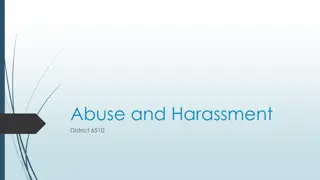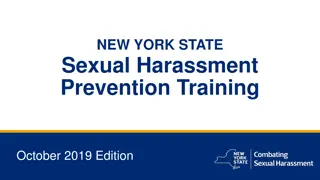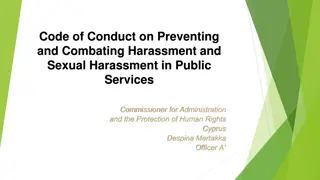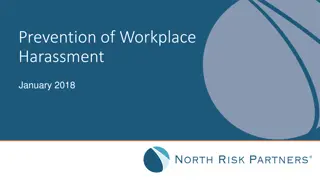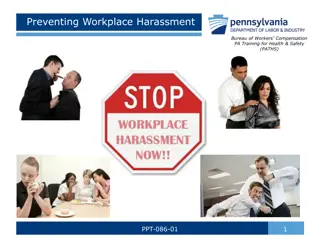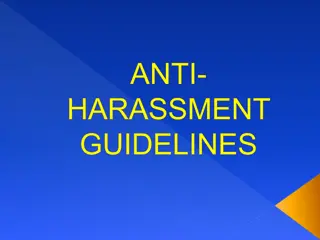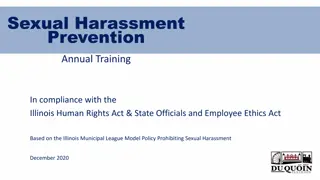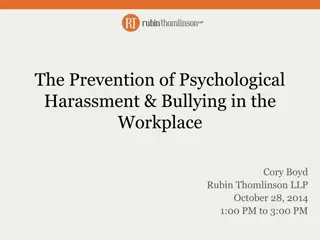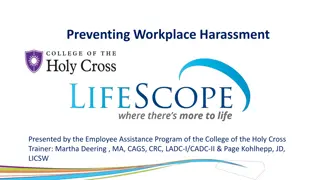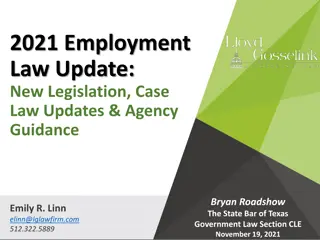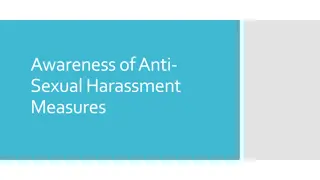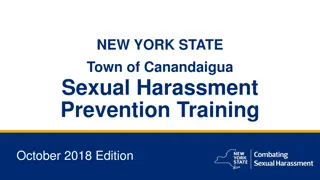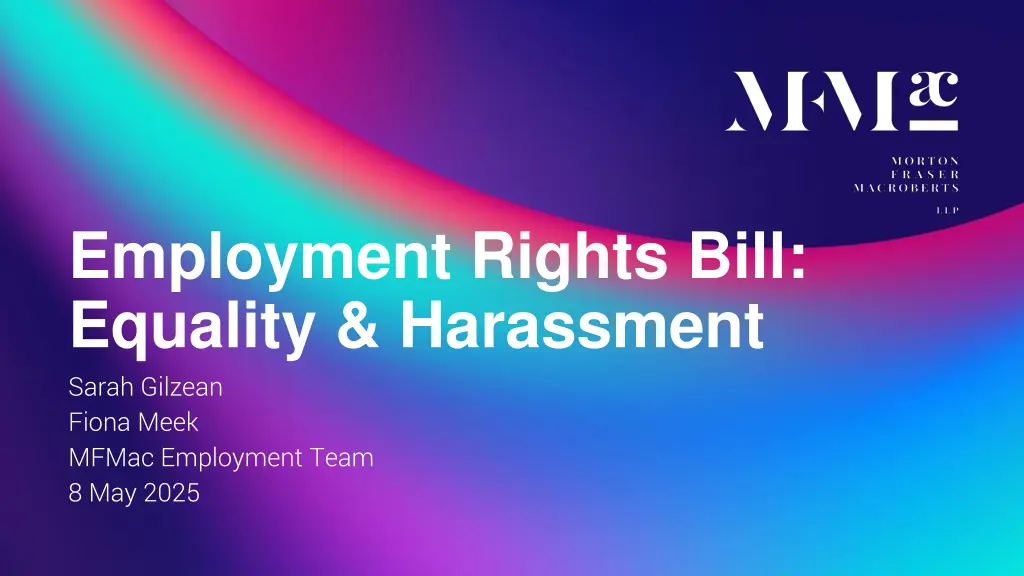
Preventing Sexual Harassment: Employer Responsibilities & Changes
Learn about the new requirements for employers to prevent sexual harassment, including the duty to take all reasonable steps, changes in preventing third-party harassment, and how sexual harassment relates to whistleblowing. Stay informed about the Equality Bill and what actions you should take to prepare for these changes.
Download Presentation

Please find below an Image/Link to download the presentation.
The content on the website is provided AS IS for your information and personal use only. It may not be sold, licensed, or shared on other websites without obtaining consent from the author. If you encounter any issues during the download, it is possible that the publisher has removed the file from their server.
You are allowed to download the files provided on this website for personal or commercial use, subject to the condition that they are used lawfully. All files are the property of their respective owners.
The content on the website is provided AS IS for your information and personal use only. It may not be sold, licensed, or shared on other websites without obtaining consent from the author.
E N D
Presentation Transcript
Employment Rights Bill: Equality & Harassment Sarah Gilzean Fiona Meek MFMac Employment Team 8 May 2025
What we will cover All All reasonable steps to prevent sexual harassment; Changes to third party harassment; Flexible working changes; Enhanced protections for pregnant employees; Equality action plans; Equal pay protections and pay gap reporting - Equality (Race and Disability) Bill; and What you should be doing to prepare.
Duty to prevent sexual harassment: What is the current position? Since October 2024 there is a duty to take reasonable steps to prevent the sexual harassment of employees. If employers do not take reasonable steps, compensation for employees can be increased by up to 25%. Enforcement is carried out by the Equality and Human Rights Commission (EHRC). The statutory all reasonable steps all reasonable steps defence is still available.
Duty to prevent sexual harassment: What is changing? The duty will be for employers to take all just reasonable steps reasonable steps , to prevent the sexual harassment of its employees. all reasonable steps reasonable steps , not What s the difference? If a tribunal finds that any reasonable step has not been taken, the duty has not been complied with. It will be more difficult to establish compliance.
Sexual harassment & whistleblowing Sexual harassment is to be a qualifying disclosure for whistleblowing purposes. Will still be required to additionally meet the public interest test. Although this makes it clear that a sexual harassment disclosure can amount to whistleblowing, there is already some protection under the current regime: Breach of health and safety. Breach of a legal obligation.
Duty to prevent third party harassment: What is changing? Employers must take all parties towards employees in the course of their employment. all reasonable steps reasonable steps to prevent harassment by third There are 3 types of harassment under the Equality Act 2010: harassment related to a relevant protected characteristic; sexual harassment; and less favourable treatment for submitting to or rejecting sexual harassment or harassment related to sex or gender assignment. A third party is defined as a person other than the employer or a fellow employee.
What are reasonable steps to prevent harassment? The EHRC Technical Guidance includes practical steps. The EHRC 8 Step Guide - Preventing Sexual Harassment at Work. The Secretary of State will have the power to specify, in regulations, steps that are to be regarded as reasonable . Steps that may be specified include: carrying out assessments; publishing plans or policies; steps relating to the reporting of sexual harassment; steps relating to the handling of complaints.
Campbell v Sheffield Teaching Hospital NHS Foundation & Anor The claimant was a black employee who worked full time as a union branch secretary. The claimant presented the harassment claim to the employment tribunal ( ET ) A colleague made a remark to the claimant capable of being racist abuse. The claimant s employer evidenced that employees were given induction covering dignity, value and respect and a follow up at appraisal. Related posters were displayed in the workplace and there was regular mandatory training. The ET and Employment Appeal Tribunal ( EAT ) accepted that all reasonable steps were taken by the employer.
Flexible working changes The Employment Rights Bill requires:- Any refusal of a request must be reasonable (statutory grounds for refusal will not change that). The employer must explain in writing:- what the ground for any refusal is; and why their refusal is considered reasonable Regulations may specify steps that employers must take to comply with the requirement to consult before rejecting a request.
Family leave and dismissal Currently: protection in relation to auto unfair dismissal and right to be offered suitable alternative employment in redundancy situation New regulations will be made banning dismissals on any grounds of women who are pregnant, on maternity leave or during the six-month period following the return to work, except in specific circumstances Protection will also apply to other forms of family leave including adoption leave, shared parental leave and neonatal care leave Regulations will set out that, where dismissal does occur, specific notices will need to be given to the employee, specific evidence an employer must produce and other procedures that require to be followed It is not yet clear what specific circumstances will be or what procedure will be required
Other family related changes in ERB Paternity and parental leave to become day 1 rights Paternity leave will be available following shared parental leave Bereavement leave of at least 1 week to be introduced as a day 1 right (parental bereavement leave will be unaffected) Proposed amendment for unpaid bereavement leave for pregnancy loss before 24 weeks
Gender equality action plans Employers with 250+ staff and certain public authorities will be required to develop and publish equality action plans showing what steps they are taking and information in relation to prescribed matters related to gender equality Prescribed matters will include: Gender pay gap action plans Menopause action plans Amendment had proposed action plan to support employees with menstrual problems and menstrual disorders - withdrawn
Gender equality action plans Regulations will specify penalties for non-compliance Regulations will set out detail of what is required and how often plans must be published, which will not be more than once every 12 months Employers will also be required to identify the providers or employers of contract workers in GPG reports but data on their pay need not be included This requirement is likely to take effect from snapshot date of 5 April 2026 (so publication in 2027)
Equality (Race and Disability) Bill Intended to extend the current pay gap reporting regime to include ethnicity and disability pay gap reporting Aim is to use similar reporting framework that is already in place for gender pay gap reporting Proposes duty to produce action plans Consultation on ethnicity and disability pay gap reporting running until 10 June 2025
Equality (Race and Disability) Bill Intended to extend equal pay rights to ethnic minority and disabled people May be by extending existing regime or by some other model Call for evidence issued on how to make the right to equal pay effective more generally Includes consideration of allowing pay comparisons between outsourced and in house workers Improving the enforcement of equal pay rights by establishing an Equal Pay Regulatory and Enforcement Unit, with the involvement of trade unions. Pay transparency Call for evidence closing on 30 June 2025
Possible timescales Action Expected timescale ERB Royal Assent July 2025 Flexible Working Third Party harassment ?* Sexual Harassment consultation on reasonable steps regs? No draft regs and part of current call for evidence No draft regs or consultation yet Protection from dismissal consultation required Provisions requiring secondary legislation to implement Not before 2026 Equality (Race and Disability) Bill Pay gap reporting Extension of equal pay to race and disability No Bill yet Consultation to 10 June Call for evidence to 30 June *Some commentators are suggesting that some provisions may come into effect in 2025 such as the changes to the duty to prevent sexual harassment, and changes to paternity and parental leave. However, this has not been confirmed and the UK Government s position as set out in the Next Steps to Make Work Pay policy paper is that the majority of reforms will take effect no earlier than 2026 .
What you should be doing to prepare Be involved respond to consultation and call for evidence Consider steps to improve data collection re disability and ethnicity Proactive steps to minimise 3rdparty harassment risks Consider gender pay action plan and any EP outsourcing risks Consider Menopause Policy and implementation
Employment Rights Bill: Equality & Harassment Sarah Gilzean Fiona Meek MFMac Employment Team 8 May 2025




